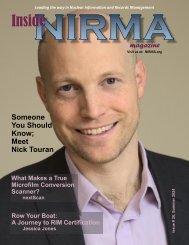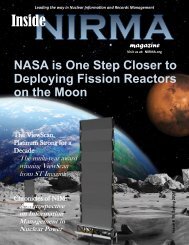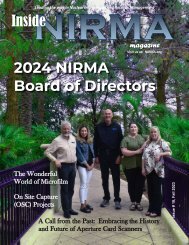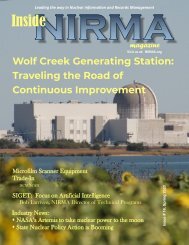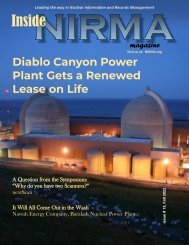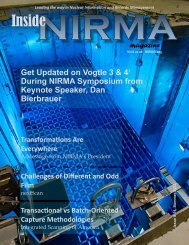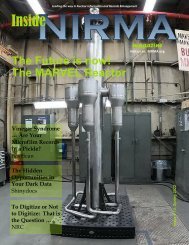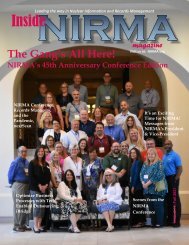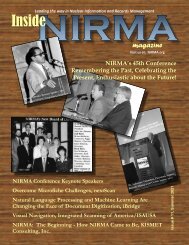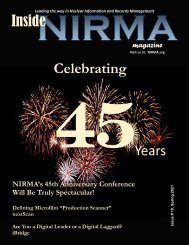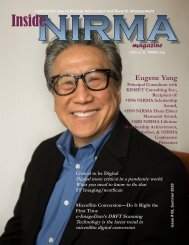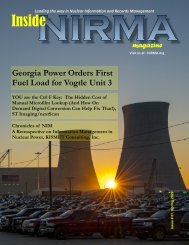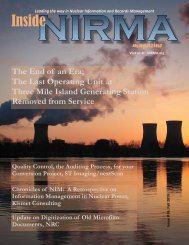Inside NIRMA Fall 2020
Create successful ePaper yourself
Turn your PDF publications into a flip-book with our unique Google optimized e-Paper software.
Inform[tion C[ptur_:<br />
Looking B_yon^ R_]or^s<br />
By Bob Larrivee<br />
Bob Larrivee Consultancy<br />
W<br />
e are increasingly hearing about information capture<br />
these days, and the important role it plays in relation<br />
to accessing it from anywhere, at any time, and on<br />
any device. This has never been more true than<br />
current times as businesses are hard pressed to keep their<br />
businesses operational using a remote workforce due to the<br />
COVID-19 outbreak.<br />
When we talk about information capture, there is a<br />
tendency to focus on records, yet records alone do not make<br />
up the entire corpus of vital business information.<br />
Information that comes from many sources and can be<br />
captured in many different ways. Of course, we are all<br />
familiar with using scanners to capture paper-based<br />
information, and there are ways to capture and ingest digitally<br />
born information like documents, spreadsheets, and more,<br />
but what of other types of information?<br />
In the nuclear industry, there is vital information<br />
related to systems, using sensors to track and manage various<br />
plant components and operational elements. Information is<br />
generated by drones, digital cameras, and humans using<br />
mobile devices like smartphones and tablets. So, information<br />
capture must now take a turn to go beyond just records to<br />
encompass a broader scope of information and ways to<br />
capture, manage, store, preserve, and share it.<br />
Information or Data or Record<br />
Over the years, I have heard and continue to hear discussions<br />
about data, data driven environments yet when you ask what<br />
data means, the response will vary greatly from person to<br />
person, based on their role within an organization. If you<br />
consider the definition that data are facts and statistics<br />
collected together for reference or analysis, one might<br />
conclude that proper context is provided in order to<br />
understand the data. It has always been my position that 42 is<br />
a data element, but without context, it is meaningless. When<br />
placed in proper context - $42.00 for a shirt – we now<br />
understand what 42 represents. This in turn makes it<br />
information containing data that is<br />
now meaningful.<br />
Once this information is<br />
ingested, analyzed, and acted upon, it<br />
might be saved and properly managed<br />
for future use, and yes, it may also be considered a record in<br />
which case it would be managed under the information<br />
governance guidelines addressing records management<br />
practices. My point here being that as curators of information<br />
and records, you must consider all possibilities of<br />
information capture, not just records.<br />
In My View<br />
The nuclear industry is unique in the sense that<br />
information and records are generated from many sources.<br />
Based on where you are employed, this information could be<br />
focused and soured within a power station, nuclear powered<br />
vessel, storage or containment facility, or logistics company.<br />
Vital information crosses departments ranging from plant<br />
operations, to human resources where employee medical<br />
records and x-rays may be found, documenting exposure<br />
levels.<br />
The devices used to capture this information might<br />
include scanners, digital business applications, robots, drones,<br />
geolocational tracking transmitters, and handheld devices.<br />
The locations of these information sources could be static as<br />
in a physical plant, or dynamic as in transport or nuclear<br />
powered vessels. In the near future, we will be capturing data<br />
from other planets as space exploration excels and the use of<br />
mini reactors increases.<br />
The time is now to look beyond records, assess what<br />
information is out there, how it is created, where it is sourced<br />
from, and what is needed to manage it securely and properly.<br />
Information and records should be viewed equally when it<br />
comes to capture not as separate entities.<br />
Back to Content | <strong>Inside</strong> <strong>NIRMA</strong> <strong>NIRMA</strong>.org <strong>Fall</strong> <strong>2020</strong> 13



